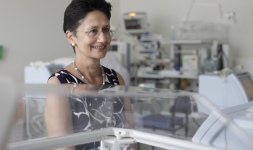Care for premature babies has improved in England

Study finds that neonatal services have improved since the introduction of clinical networks - News
Adapted from a news release issued by the British Medical Journal
Wednesday 4 April 2012
Neonatal services in England have improved since they were reformed to increase cooperation between hospitals in 2003, according to a new study published online today in the British Medical Journal.
See also:
Related news stories:
After a Department of Health review, neonatal services were organised into managed clinical networks so that clusters of hospitals providing different levels of specialist care could work in collaboration. This restructuring aimed to increase the proportion of premature babies born in a specialist care unit and reduce the number of acute (within 24 hours of birth) postnatal transfers from one hospital to another. The specialised delivery and management of premature babies is associated with improved outcomes while acute postnatal transfer is associated with adverse outcomes.
Researchers from Imperial College London looked at 294 maternity and neonatal units in England, Wales and Northern Ireland between 1998 and 2000 and 146 neonatal units in England between 2009 and 2010, covering the births of 6,441 babies born at 27-28 weeks of gestation.
The researchers, funded by a National Institute for Health Research (NIHR) Programme Grant for Applied Research, found that the reorganisation has been met with some success. The proportion of babies delivered at specialist care centres increased from 18% to 49% between the two time frames. The proportion of premature babies that survived to 28 days increased from 88% to 93%.
However, half of premature babies are still delivered in non-specialist units, suggesting poor co-ordination between maternity and neonatal services. Furthermore, the proportion of babies transferred between hospitals within 24 hours has increased from 7% to 12% and of these a third are to an equivalent or less specialised neonatal unit. A third of multiple birth babies continue to be treated in separate units, showing a continuing inadequacy in cot capacity.
The authors conclude that two aims of the reorganisation are being realised: a higher proportion of babies are being born in specialist care units and are then being back-transferred to a neonatal unit nearer home when they no longer require highly specialised care. The authors argue however that co-ordination between maternity and neonatal services remains poor and that further research will help to clarify issues around the organisation of specialist newborn care.

Professor Neena Modi
Professor Neena Modi, from the Department of Medicine at Imperial College London, who led the research, said: “The rate of preterm birth is increasing worldwide, and extremely premature babies need highly specialised neonatal intensive care immediately after they are born. High quality neonatal care in specialist centres is vital to help these babies make it through their difficult first weeks and reduce the risk of long-term complications. Our findings show that considerably more babies are being born in environments where they get the best care compared with 10 years ago, but there’s still a lot of room for improvement. In particular we are worried by the continued separation of twins and triplets, the evidence of insufficient cot capacity, and poor coordination between neonatal and maternity services”.
Jane Abbott, Head of Programmes at Bliss, a UK charity for premature babies that collaborated in the research, said: “Bliss welcomes these findings which show that the introduction of managed clinical networks has brought about improvements in the delivery of neonatal care. It is very encouraging to see that more babies requiring specialist treatment are being born in units that can provide the right level of care. This reinforces the importance of managed clinical networks and their contribution to improving outcomes for babies born sick or premature. However, it is clear that investment into neonatal care and better coordination between maternity and neonatal services needs to be made a priority to ensure to best outcomes for all babies and their families.”
Reference: C. Gale et al. ‘The impact of managed clinical networks on NHS specialist neonatal services in England: a population-based study.’ British Medical Journal, published online 4 April 2012.
Article text (excluding photos or graphics) © Imperial College London.
Photos and graphics subject to third party copyright used with permission or © Imperial College London.
Reporter
Press Office
Communications and Public Affairs
- Email: press.office@imperial.ac.uk
